Table of Contents
A present participle phrase starts with a verb ending in -ing and acts like an adjective to describe a noun or pronoun. It provides extra details about an action or state happening alongside the main action, making sentences clearer and more engaging. Learning how to use present participle phrases can help improve your writing by adding depth and description.
What is present Participle Phrase?
A present participle phrase is a group of words that begins with a present participle (a verb ending in -ing) and acts as an adjective to describe a noun or pronoun.
Examples:
Running quickly, she caught the bus.
Talking loudly, he interrupted the meeting.
Swimming in the pool, they had a great time.
How to Form Present Participle Phrases
To form a present participle phrase, follow these steps:
1. Start with a verb:
Choose a verb that ends in -ing (e.g., running, singing, swimming).
2. Add modifiers or objects:
You can include words that modify the action or provide additional details, such as adverbs or objects.
3. Place the phrase near the noun or pronoun it describes:
Ensure the phrase is close to the word it is modifying to avoid confusion.
Function of Present Participle Phrase
A present participle phrase functions as an adjective, providing more detail or description about a noun or pronoun in a sentence. It typically describes an action or state that happens at the same time as the main action, helping to give more context or explanation.
Examples:
- Running late, she missed the train.
(The phrase Running late describes she and explains why she missed the train.)
- Singing loudly, the children played outside.
(The phrase Singing loudly describes the children and adds detail to their action.)
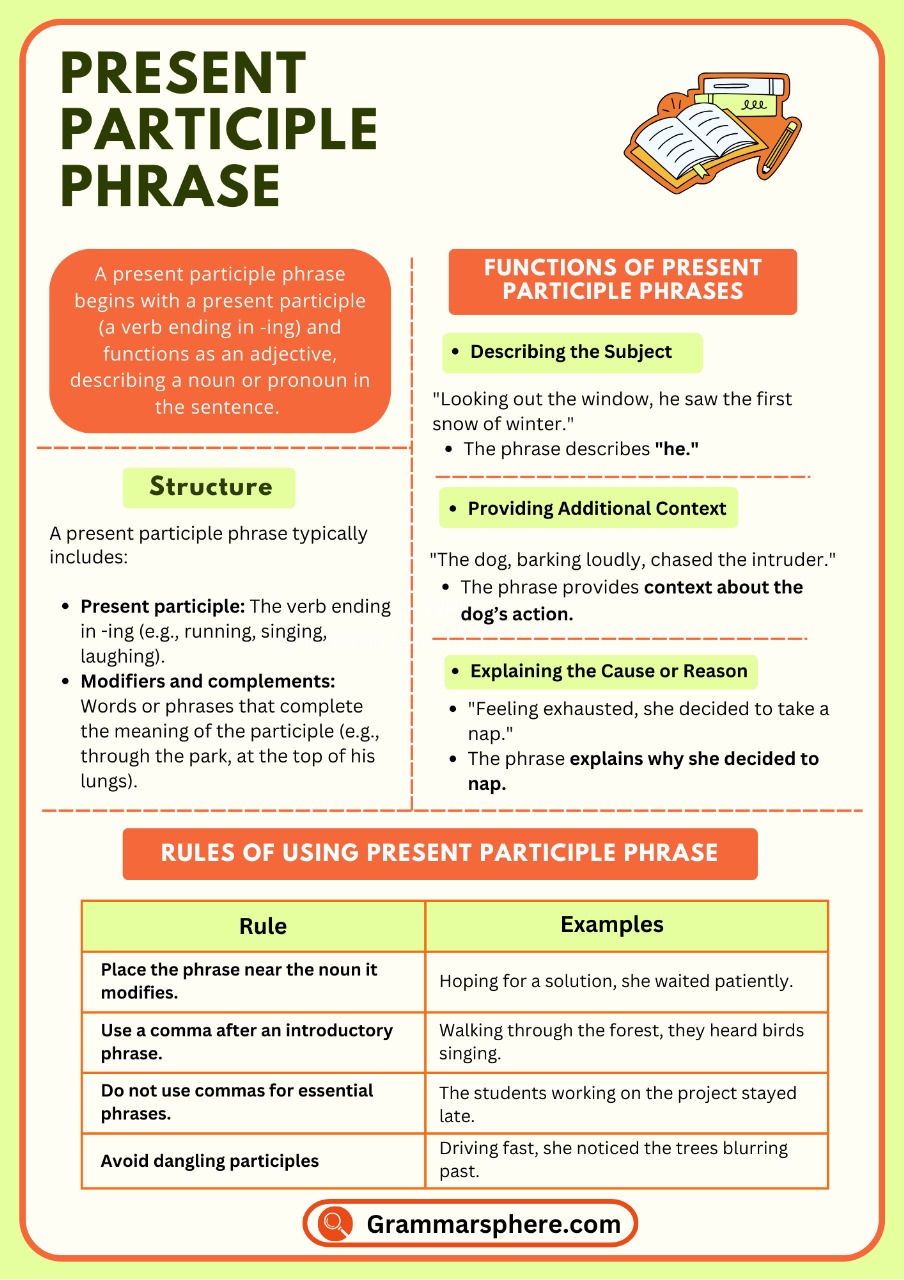
Rules of Present Participle Phrase
A present participle phrase begins with a verb ending in -ing and acts as an adjective, describing a noun or pronoun in the sentence. It often adds more detail about an action happening at the same time as the main action.
1. Starts with a verb ending in -ing
The phrase always begins with a verb that ends in -ing, such as running, singing, or talking.
- Running fast, she caught the bus.
(The phrase Running fast begins with the verb running.)
2. Describes a noun or pronoun
The phrase functions as an adjective and provides more information about a noun or pronoun in the sentence.
- Talking loudly, he interrupted the meeting.
(The phrase Talking loudly describes he.)
3. Can include other words
A present participle phrase can have additional words, like objects or modifiers, that help explain the action further.
- Swimming in the pool, they had fun.
(The phrase Swimming in the pool includes extra information about where the action is taking place.)
4. Describes actions happening at the same time
The phrase usually shows an action or state that is happening at the same time as the main action in the sentence.
- Laughing at the joke, she spilled her drink.
(The phrase Laughing at the joke describes an action happening while she is spilling the drink.)
5. Must be placed near the noun it describes
To avoid confusion, the present participle phrase should be placed next to the noun or pronoun it is modifying.
- Running late, he missed the train.
(The phrase Running late clearly describes he.)
Present Participle Phrase vs Past Participle Phrase
| Feature | Present Participle Phrase | Past Participle Phrase |
|---|---|---|
| Definition | A phrase beginning with a present participle (-ing form) that describes a noun. | A phrase beginning with a past participle (-ed, -en, etc.) that describes a noun. |
| Function | Shows an ongoing or simultaneous action related to the noun. | Shows a completed action or passive state related to the noun. |
| Example Sentence | The girl, smiling brightly, walked into the room. | The book, written by Ahmed, became a bestseller. |
| Key Verb Form | -ing form of the verb (running, smiling, thinking). | Past participle form of the verb (written, broken, painted). |
| Usage | Often describes something happening at the same time as the main action. | Often describes something that already happened before the main action. |
Present Participle Phrase Example Sentences
- Running fast, she caught the bus.
- Singing loudly, the children played in the yard.
- Working hard, he completed the project.
- Walking slowly, they enjoyed the evening.
- Dancing gracefully, she impressed the judges.
- Reading quietly, he finished the book in one sitting.
- Laughing at the joke, she dropped her coffee.
- Jumping high, the athlete won the competition.
- Talking excitedly, they shared their plans for the trip.
- Driving carefully, he avoided the accident.
Common Mistakes
1. Dangling Participle (Unclear Subject)
The phrase must clearly modify the correct noun.
❌ Walking to school, the rain soaked Aisha. (Did the rain walk to school?)
✅ Walking to school, Aisha got soaked in the rain.
2. Misplacing the Present Participle Phrase
The phrase should be next to the noun it describes.
❌ She saw a bird flying in the park with blue feathers. (Is the park flying?)
✅ She saw a bird with blue feathers flying in the park.
3. Overusing Present Participle Phrases
Using too many can make a sentence confusing.
❌ Running late, grabbing her bag, and texting her friend, Sarah rushed out.
✅ Running late, Sarah grabbed her bag and texted her friend before rushing out.
FAQS:
How do you identify a participle phrase in a sentence?
To identify a participle phrase in a sentence, look for a verb ending in -ing (present participle) or -ed (past participle) that functions as an adjective. The phrase usually includes other words that modify the action or provide additional details.
It will describe or give more information about a noun or pronoun, and is typically placed next to the word it modifies.
What is Present Present Participle Example
Running late, she missed the train.
In this sentence, the phrase Running late is the present participle phrase.
It describes she and explains the reason she missed the train. The phrase adds more detail about her action, showing that she was in a hurry and did not make it to the train on time.
10 Examples of present participle sentences
Running quickly, he caught the bus.
Singing loudly, she entertained the crowd.
Walking down the street, I saw a friend.
Reading a book, he forgot the time.
Dancing gracefully, the ballerina amazed the audience.
Swimming in the lake, they felt refreshed.
Talking excitedly, they shared their plans.
Laughing together, they enjoyed the moment.
Driving carefully, she avoided the accident.
Writing notes, he listened to the lecture.
You May Also Like

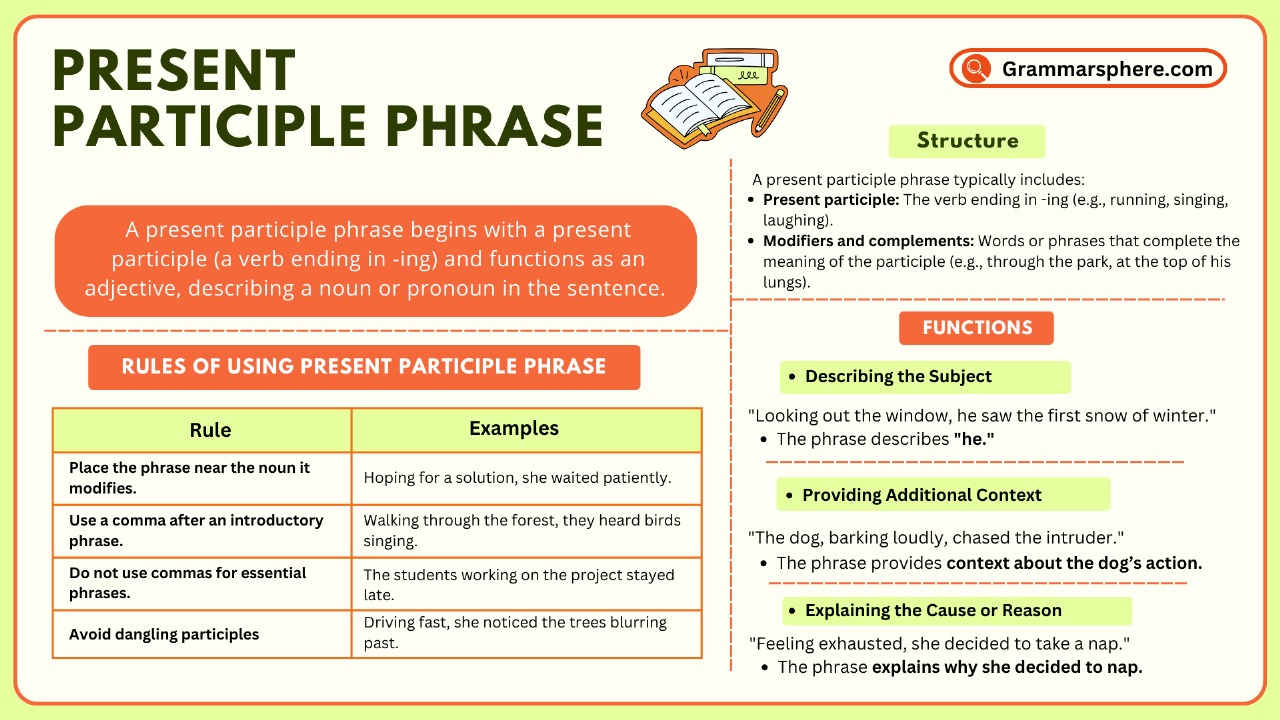

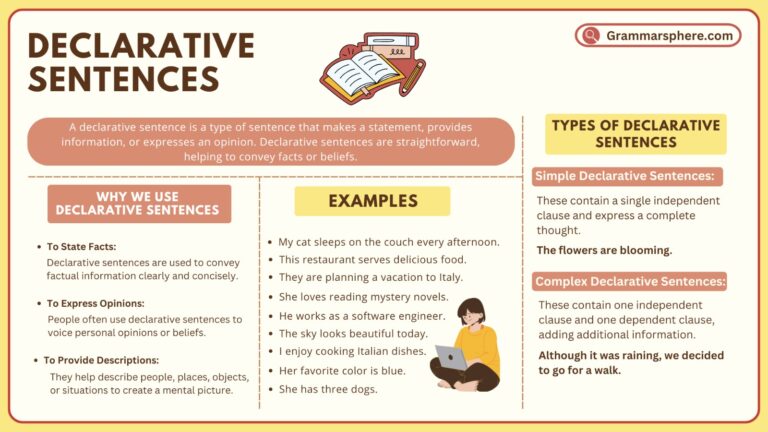
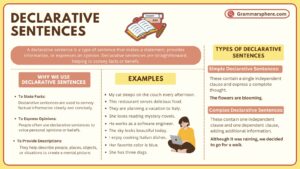
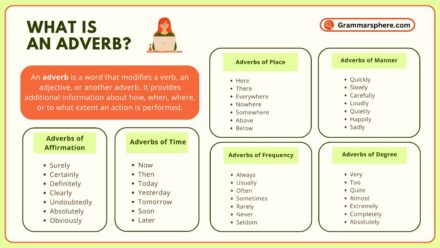
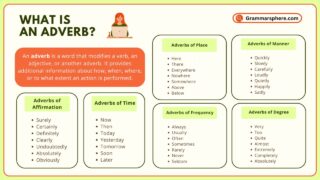
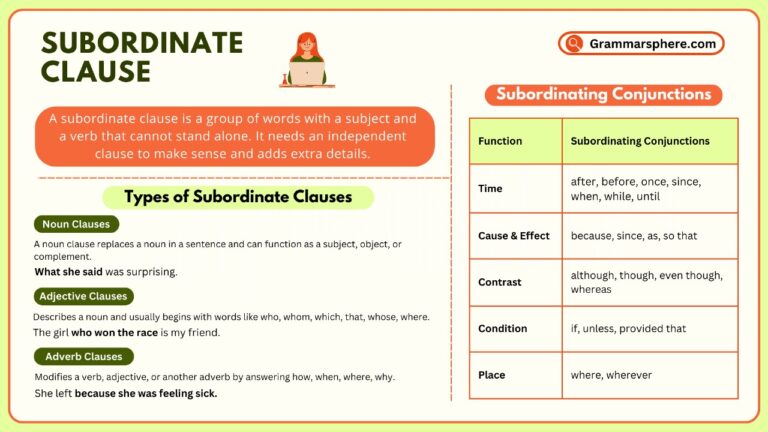
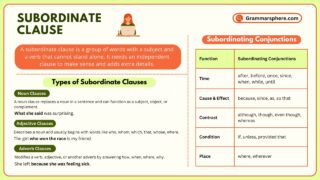
Leave a Comment